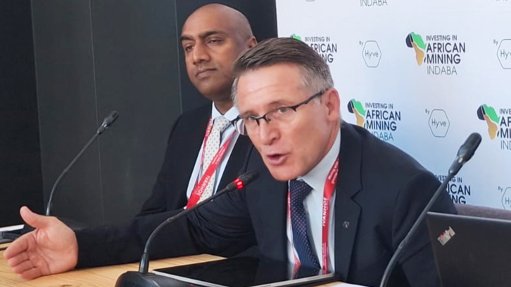Tropics hardest hit as wildlife populations drop 69% since 1970 - WWF
Global conservation organisation World Wide Fund for Nature (WWF) has released its 'Living Planet' report for 2022, which shows that monitored wildlife populations, namely mammals, birds, amphibians, reptiles and fish, have seen a 69% decline on average since 1970.
The report highlights the stark outlook of the state of nature and urgently warns governments, businesses and the public to take transformative action to reverse the destruction of biodiversity.
The report indicates that the main drivers of wildlife population decline around the world are habitat degradation and loss, exploitation, the introduction of invasive species, pollution, climate change and disease. Several of these factors played a part in Africa’s 66% fall in its wildlife populations over the period, as well as Asia Pacific’s overall 55% drop.
“The [report] makes it clear that delivering a nature-positive future will not be possible without recognising and respecting the rights, governance, and conservation leadership of indigenous peoples and local communities around the world,” the WWF averred.
The report argues that increasing conservation and restoration efforts, producing and consuming food in particular more sustainably, and rapidly and deeply decarbonising all sectors can mitigate the twin crises. The authors call on policymakers to transform economies so that natural resources are properly valued.
Using its biggest dataset yet, featuring almost 32 000 populations of 5 230 species, the Living Planet Index (LPI), provided within the report by Zoological Society of London (ZPL), shows it is within tropical regions that monitored vertebrate wildlife populations are plummeting at a particularly staggering rate, the nature conservation organisation said.
“WWF is extremely concerned about this trend given that these geographical areas are some of the most biodiverse in the world. In particular, the LPI data reveals that between 1970 and 2018, monitored wildlife populations in Latin America and the Caribbean region have dropped by 94% on average. In Africa, that figure is 66%.”
Further, monitored freshwater populations have fallen by an average of 83%, which is the largest decline of any species group. Habitat loss and barriers to migration routes are responsible for about half of the threats to monitored migratory fish species.
Some of the species populations captured in the LPI include the Amazon pink river dolphin population, which saw populations plummet by 65% between 1994 and 2016 in the Mamirauá Sustainable Development Reserve in the Brazilian state of Amazonas; the eastern lowland gorilla, whose numbers saw an estimated 80% decline in DRC’s Kahuzi-Biega National Park between 1994 and 2019; and populations of the Australian sea lion, which declined by 64% between 1977 and 2019.
“The LPI highlights how we have cut away the very foundation of life and the situation continues to worsen. Half of the global economy and billions of people are directly reliant on nature,” said ZSL conservation and policy director Dr Andrew Terry.
“Preventing further biodiversity loss and restoring vital ecosystems has to be at the top of global agendas to tackle the mounting climate, environmental and public health crises,” he said.
World leaders are due to meet at the fifteenth Conference of Parties to the Convention of Biological Diversity (CBD COP15) in December for a once-in-a-decade opportunity to course-correct for the sake of people and the planet.
“WWF is advocating for leaders to commit to a ‘Paris-style’ agreement capable of reversing biodiversity loss to secure a nature-positive world by 2030,” the organisation highlighted.
“The key message from this year’s Living Planet Report is that the evidence of the damage we are doing to biological systems is incontrovertible. Although this is depressing to environmental organisations working to reverse this decline, what should fill us with some hope is that this signal can no longer be ignored” said WWF South Africa CEO Dr Morné du Plessis.
“Businesses, governments, civil society and individuals must take urgent steps to protect nature and the biological systems that underpin our very existence as human beings. This is no longer an option, but an imperative,” he emphasised.
“We face the double emergencies of human-induced climate change and biodiversity loss, threatening the well-being of current and future generations. WWF is extremely worried by this new data showing a devastating fall in wildlife populations, in particular in tropical regions that are home to some of the most biodiverse landscapes in the world,” concurred WWF International director-general Marco Lambertini.
“At the [CBD] COP15 biodiversity conference this December, leaders have an opportunity to reset our broken relationship with the natural world and deliver a healthier, more sustainable future for all with an ambitious nature-positive global biodiversity agreement.
“In the face of our escalating nature crisis, it is essential this agreement delivers immediate action on the ground, including through a transformation of the sectors driving nature loss and financial support to developing countries.”
Article Enquiry
Email Article
Save Article
Feedback
To advertise email advertising@creamermedia.co.za or click here
Announcements
What's On
Subscribe to improve your user experience...
Option 1 (equivalent of R125 a month):
Receive a weekly copy of Creamer Media's Engineering News & Mining Weekly magazine
(print copy for those in South Africa and e-magazine for those outside of South Africa)
Receive daily email newsletters
Access to full search results
Access archive of magazine back copies
Access to Projects in Progress
Access to ONE Research Report of your choice in PDF format
Option 2 (equivalent of R375 a month):
All benefits from Option 1
PLUS
Access to Creamer Media's Research Channel Africa for ALL Research Reports, in PDF format, on various industrial and mining sectors
including Electricity; Water; Energy Transition; Hydrogen; Roads, Rail and Ports; Coal; Gold; Platinum; Battery Metals; etc.
Already a subscriber?
Forgotten your password?
Receive weekly copy of Creamer Media's Engineering News & Mining Weekly magazine (print copy for those in South Africa and e-magazine for those outside of South Africa)
➕
Recieve daily email newsletters
➕
Access to full search results
➕
Access archive of magazine back copies
➕
Access to Projects in Progress
➕
Access to ONE Research Report of your choice in PDF format
RESEARCH CHANNEL AFRICA
R4500 (equivalent of R375 a month)
SUBSCRIBEAll benefits from Option 1
➕
Access to Creamer Media's Research Channel Africa for ALL Research Reports on various industrial and mining sectors, in PDF format, including on:
Electricity
➕
Water
➕
Energy Transition
➕
Hydrogen
➕
Roads, Rail and Ports
➕
Coal
➕
Gold
➕
Platinum
➕
Battery Metals
➕
etc.
Receive all benefits from Option 1 or Option 2 delivered to numerous people at your company
➕
Multiple User names and Passwords for simultaneous log-ins
➕
Intranet integration access to all in your organisation


















